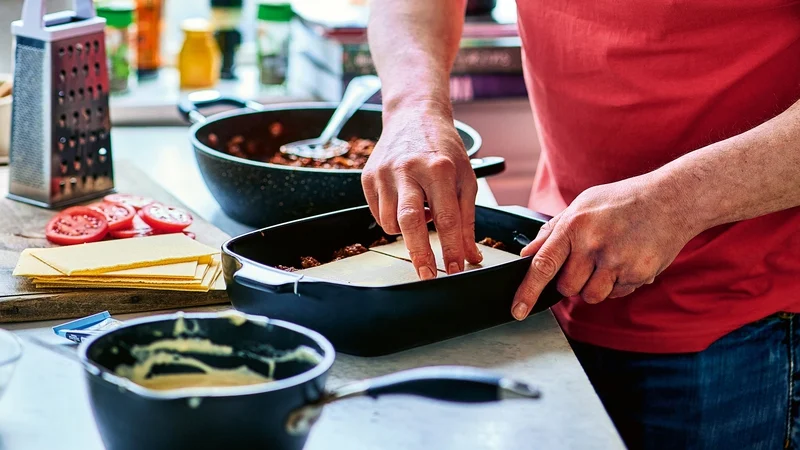
Former roofer Ian Bursnall knows a thing or two about cutting costs in the kitchen.
Growing up in a family of seven people, he says his mum “was able to stretch food a long way on a budget”, which is something he’s definitely inherited.
After setting up an Instagram account, The Skint Cook, which now has 12.8k followers, he appeared on Jamie Oliver’s The Great Cookbook Challenge television show in 2022.
Bursnall, 47, says he was practically forced to learn how to cook when he moved out of home around 17 or 18 years old.
“My mum gave me a load of pots and pans and some recipes scribbled down on pen and paper – there was no Facebook and all that in those days,” he remembers.
“It was either me cook, or eat rubbish. So I started to cook and then my mates used to come around on a Friday – I was doing things like chilli con carne or stews, and they seemed to love it.” Health issues meant Burnsall had to step away from roofing, and now he cooks for his partner Donna and whoever from their children and grandchildren join the dinner table.
“Money was tight – still is tight to this day,” he says, meaning Leicester-based Bursnall has become an absolute pro at saving money in the kitchen.
The recipes in his debut cookbook, The Skint Cook, are the meals he’s been making for years. He says it’s “what I’ve been cooking day in, day out, week in, week out, month in, month out – year in, year out, with friends and family” – and these are his tips for making cost-effective dishes that are still delicious.
Reduce your meat intake
“Meat’s obviously a big expense,” says Bursnall. Price-wise, he tends to stick to cheaper varieties – like chicken rather than beef or lamb – while generally cutting down a lot more.
“We’ve been eating meat once or twice a week – that’ll bring the cost of food down,” he adds.
You don’t have to skip meat entirely, but you can supplement it with cheaper ingredients.
“If you’re doing things like chilli con carne, you can minimise the meat intake and bulk it out with things like kidney beans, tinned tomatoes, baked beans,” he advises.
Stock up on the essentials
If you’ve got a well-stocked cupboard, anything is possible in the kitchen.
“Build up your cupboard, all your spices – people say they go off, they don’t unless you don’t use them in five years,” Bursnall says.
“Build your store cupboard with all your spices, all your staples. You don’t have to do it all in one go, buy a bit here and there – even at Christmas and birthdays ask your family and friends. Don’t waste money on chocolate – get me some spices.”
With herbs and spices you can “pimp anything up to the next level”, he says, “just use your imagination”.
If your store cupboard is well-stocked, you don’t have to constantly go to the supermarket and spend more money.
One of Bursnall’s favourite recipes is a tomato soup made entirely from ingredients you’ll already have hanging about. “If you’ve got them in your house that day, you don’t have to go anywhere – whip that soup up and have some nice cheese and pickle sandwiches with it.”
Make your ingredients last longer
If you’re not constantly chucking out ingredients that have gone off, you’ll start saving a lot of money.
That’s why Bursnall recommends really thinking about how you store your fruit and veg: “Things like iceberg lettuce – when you’ve used a slice of it, wrap it really well and it lasts five times longer than it would otherwise.
“Wrap your cucumbers up, cover your tomatoes and peppers – that’ll put the shelf life up.”
The same logic applies to using up leftovers.
“Never throw your leftovers [out] – like roast potatoes, you can do a really nice bubble and squeak the next day.”
Burnsall recommends making a curry from any leftover meat you might have and any veg can easily be chucked into a delicious soup.
Don’t worry about planning too much
One of the biggest tips you often hear about saving money in the kitchen is to meticulously plan every meal you eat.
While that might work for some people, Bursnall doesn’t think it’s necessarily the one and only key to cost-cutting.
He remembers working with obsessive planners – and every Tuesday they’d have the same thing. “I’d think: you might not want that, that night? I go out to the supermarket at the time when all the bargains are out, see what there is and think something up.
“I never plan what we’re having – today I woke up and we weren’t going to have chilli con carne, but we are now. I don’t plan months in advance, I think that’s a bit boring – I think go out and act on your impulse and create something, and you’ll be surprised.”




























